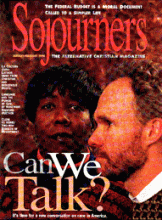After the 1992 riots following the first Rodney King verdict, I joined a delegation of international church leaders to Los Angeles. We were there to conduct hearings and listen to community groups around the city. Some of us met with Crips and Bloods in Watts who had just made their first truce. It's a remarkable
story that I've told many times before, and it helped lead to the national Gang Peace Summit in Kansas City the following year.
But a story I've never written about occurred two nights later in a very different kind of community. Simi Valley had been the site of the Rodney King trial, the place where an all-white jury had acquitted the police officers seen brutally beating King on the infamous video. Overnight, this sleepy, affluent suburb became famous as a bastion of upper-middle-class white racism. It was a notoriety not welcomed by the citizens of Simi Valley.
Several of our delegation traveled to the embattled suburb one night to participate in a dialogue that had been set up between a black church and a white church in Simi Valley. Yes, despite the public perception, there are black people in Simi Valley, mostly middle-class professionals like most of their neighbors. These two churches, while inhabiting the same community, had never before met or spoken together. The atmosphere was tense, perhaps made more so by the presence of outside "church leaders." Nonetheless a substantial and fascinating conversation followed.
The pivotal moment in the discussion came when a black mother spoke. "My son is a member of the Los Angeles Police Department," she said, "and I become deeply concerned for his safety when he goes undercover." Across the room, a white woman responded with great sympathy. "I am a mother too, and I know how you must feel. If my son were a police officer and worked undercover, I'd be frightened to death if he had to work with those gangs."
Read the Full Article
